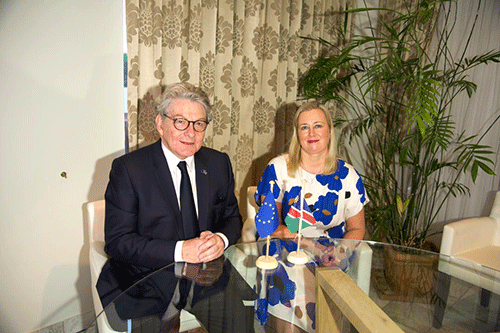Acknowledging Germany’s genocide of Namibians, European Union commissioners said while the dark past should not be forgotten, greater focus must be placed on the future.
This is the EU’s approach toward Namibia, as the block embarks on deepening ties with the southern African nation that spans three decades.
During a sit-down interview that covered wide-ranging issues, the two visiting commissioners, Thierry Breton (internal market) and Jutta Urpilainen (international partnerships), zeroed in on their mission to Namibia.
In contemporary Namibia, the genocide meted out against the Nama and Ovaherero communities remains one of the unclosed, hideous chapters.
German troops massacred and displaced tens of thousands of Namibians in 1904-1908.
As things stand, Germany has only proffered development projects worth 1.1 billion euros (N$18 billion) in seven identified regions as reparations for genocide.
Namibia’s N$1.1 trillion demand takes into account loss of life, dispossession of land and displacement, among others.
Last week, a lawsuit was filed against Namibia’s agreement with Germany to recognise the colonial-era genocide of the Herero and Nama.
Representatives claim that it is illegal, as descendants are not directly compensated.
Asked if demands for reparations by the affected communities were justified, the two commissioners appeared evasive, instead of only fixing their eyes on prospects.
At the onset, Breton presented himself as well-versed in African history.
“I am also African. I know exactly what [the genocide] you are talking about. This is based on our history… it’s true in Africa. In many, many countries, starting also with slavery. It’s unfortunate in many other countries… that’s our history. We should never forget. That’s very true,” Breton told New Era.
He then turned to the future, with optimism, saying assisting and partnering with other countries has always been in Europe’s DNA.
His sentiments were echoed by Urpilainen.
“I think it’s important to recognise the history and always have the dialogue with different ethnic groups, minority groups… at the same time, I fully agree with Thierry Breton that we have to focus on the future,” she said.
To achieve this, the EU wants to create equal and mutually beneficial ties with African countries, including Namibia, she said.
“We are here to offer you some possibilities, which we see are benefiting both of us. We look at the renewable energy resources, green hydrogen or raw materials or digital [transformation] that was discussed already. We want to be your partner. From our perspective, we have a positive offer through this global gateway business strategy,” Urpilainen expounded.
The Finnish politician then hastened to say the EU does not subscribe to teaching or dictating to Namibia.
“We also want to bring European companies to invest in this country, to create jobs and to really create value for this country and its citizens. And in the end, it is Namibia’s decision to decide with whom they are willing to partner. We respect that. Namibia is a sovereign state. But based on the history and the good relationship we have had so far, over 30 years, I am optimistic and also empowered by what I’ve seen today,” she added.
Going deeper
The EU’s agenda towards Namibia is primarily hinged on education, youth empowerment and human development.
The union now wants to expand its cooperation with Namibia in new areas, such as the green energy transition.
“We want to invest in renewable energy resources, especially green hydrogen as well as raw materials’ value chains,” the international partnership commissioner emphasised.
It is the first time that the EU dispatched two commissioners to Namibia in one go.
This, it could be deduced from the discussion, is due to Namibia’s newfound position as a strategic partner in Africa.
Breton, on the other hand, said the EU’s investments will benefit Namibia greatly, as they aim to create industries, as opposed to exporting raw materials from the country.
“We want to make sure that we will be able to help, develop [and] to support every activity in the mining industry. There are a lot of reserves, but we want to do this of course while adding value to Namibia. It’s not only extracting minerals… [whether it’s] lithium, cobalt [or] tin. It’s also about industries to make sure everything will be done here,” he said.
As a digital expert, Breton is at the forefront of “working at the level of the EU with the constellation, which is a low outreach constellation providing secure connected services using satellites for Europe and Africa”.
“For Africa, it’s for the whole continent, including Namibia. We believe that it’s extremely important to have more exchange in this digital space – and that, of course, we will be able to offer easy access to everyone to digital infrastructure because, at the end of the day, it is what is needed,” he explained.
Much of this is due to recent oil discoveries and the hyped green hydrogen phenomenon.
Choose wisely
The commissioners advised Namibia to pick the right investment partners if the country is to reap maximum returns from its resources.
“You carefully select the partner,” Breton said.
“What we are willing to do is to make sure for value to be created in these areas; transformation and digital will be located here in Namibia… we are long-term partners, and we know that what we want to do is not to take the reserves [that are] not refined and go elsewhere on a boat,” he said.
A classic example is the lithium that is controversially being shipped out of Namibia unprocessed.
“Extracting lithium is 2 000 euros per tonne. [But] when it’s refined, it’s 80 000 euros. We want this to be created and located in Namibia,” he said, projecting the EU as the ideal partner.
– emumbuu@nepc.com.na


